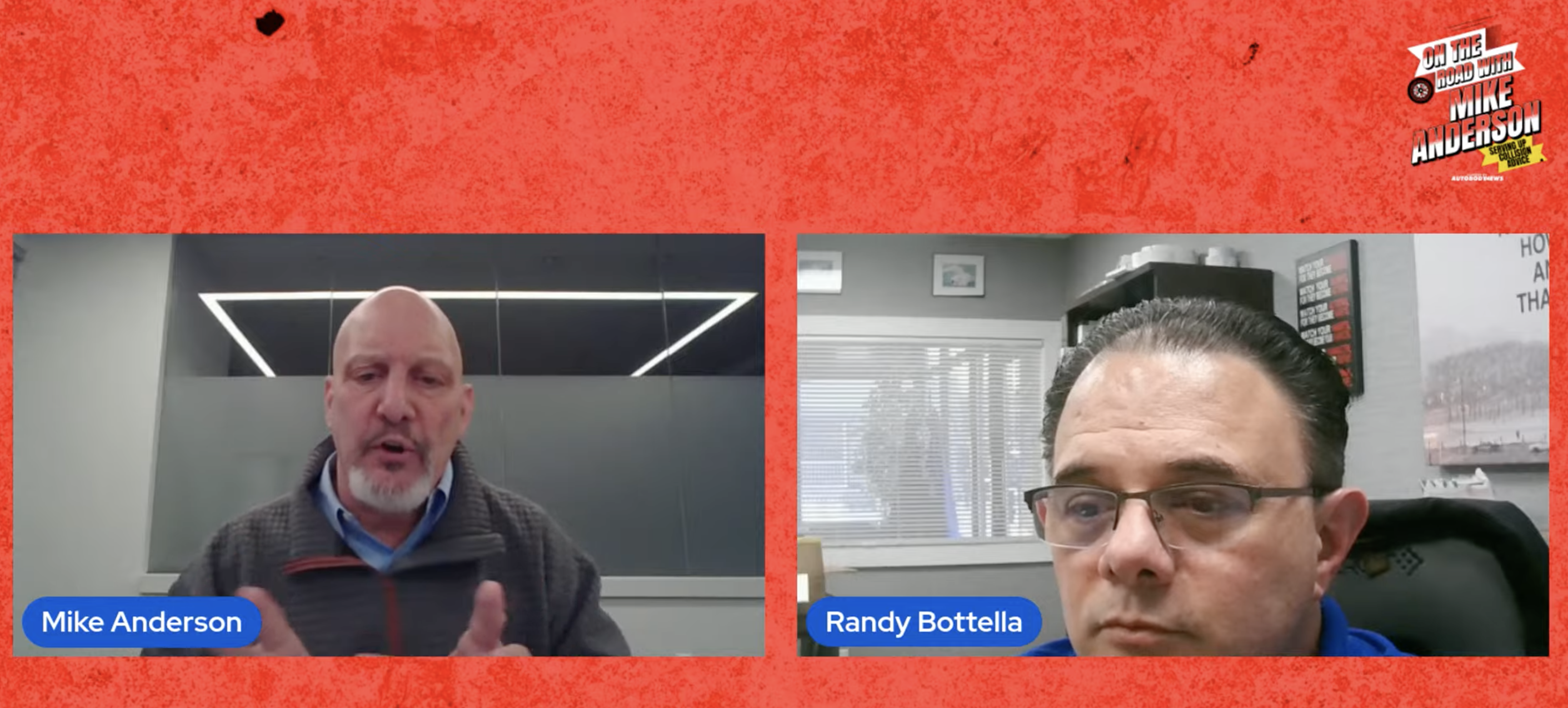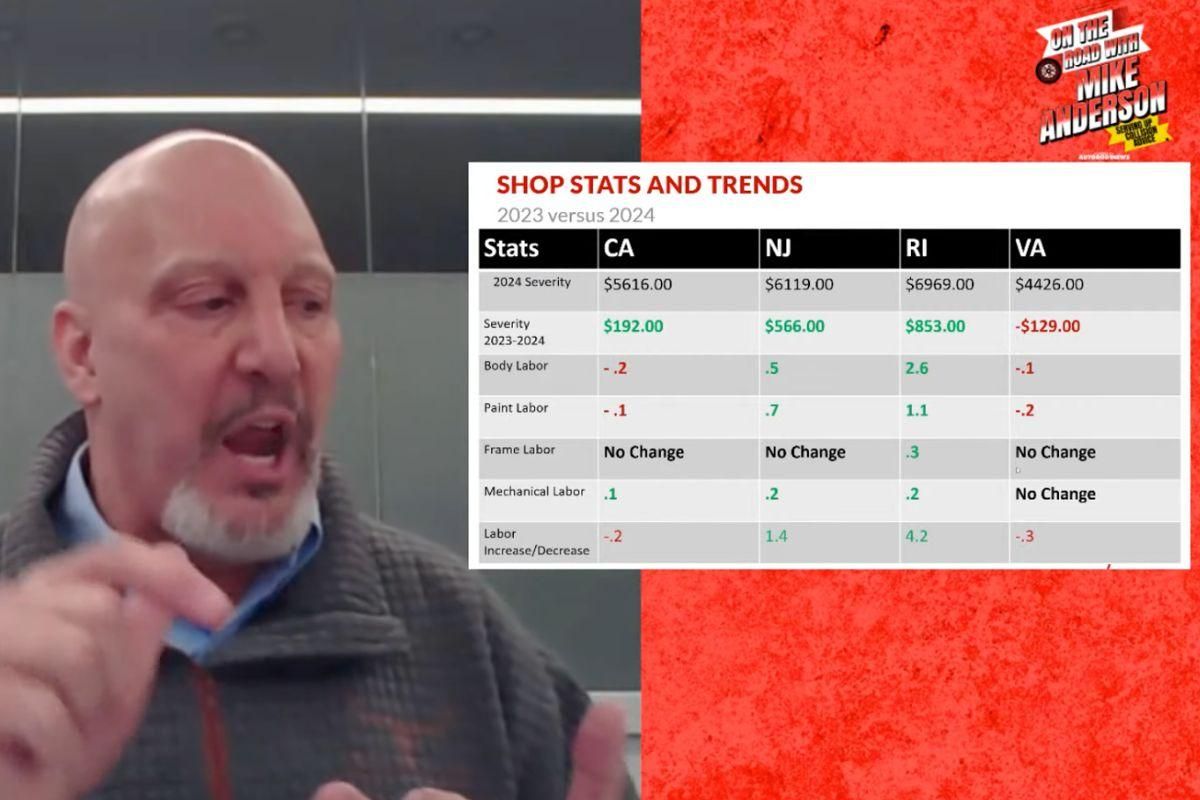“On the Road with Mike Anderson -- Serving Up Collision Advice,” a new monthly live podcast powered by Autobody News, premiered Feb. 10 with guest Randy Bottella, president of the Auto Body Association of Rhode Island (ABARI), who spoke about how his association changed the legislative landscape for the state’s repairers -- and how other states can do the same.
Anderson, who was joined by Sheryl Driggers, his colleague at Collision Advice, also fielded questions from the audience, submitted before the show.
A full replay is available on Autobody News' YouTube channel:
Anderson opened the show by looking at state-by-state trends in collision repair in 2024. Rhode Island had the highest average severity in the U.S., at $6,969, including both DRP and non-DRP claims.
Rhode Island also showed increases between 2023 and 2024 in the average number of labor hours per repair in body, paint, frame and mechanical -- an overall increase of 4.2 hours.
Anderson said Rhode Island’s high average severity can be largely attributed to its legislation. Bottella, who also owns Reliable Collision Repair in West Warwick, RI, agreed.
“We went to legislators because we couldn’t solve this on our own,” he said.
Over the past 15 years, ABARI members have worked tirelessly to educate legislators in order to enact laws that help collision repairers get fairly compensated for performing safe, proper repairs -- which ultimately pays off for consumers, who can be sure their vehicles are restored to pre-collision condition.
Rhode Island’s Aftermarket Parts Law
Bottella said about 15 years ago, Rhode Island passed a law prohibiting insurers from requiring the use of non-OEM parts on vehicles less than 48 months beyond their manufactured date, unless the repairer received written consent from the vehicle owner to use non-OEM parts.
 Mike Anderson, left, and Randy Bottella, right.
Mike Anderson, left, and Randy Bottella, right.
Last year, Rhode Island passed a bill forbidding insurance companies from refusing the use of OEM parts for vehicles between 48 to 72 months from their manufactured date. The length of time was adjusted in response to the increase in the cost of a vehicle and how long most owners take to pay off an auto loan.
Bottella said getting the first law written and passed was the “heavy lift.” ABARI brought aftermarket and OEM parts to the Rhode Island State House as a “show and tell” to illustrate the difference in quality to lawmakers.
“That really hit home,” he said.
ABARI also showed lawmakers that OEM repair procedures require OEM parts for leased vehicles, and that customers could be charged for using aftermarket parts in a repair when turning the vehicle in at the end of the lease. ABARI invited consumers to testify about real situations where they were harmed by the problematic claims process.
“Once they saw it could put consumers in harm’s way, they passed the law to protect consumers,” Bottella said.
He said most shops have a customer request form for OEM parts, which becomes part of the documentation turned into the insurance appraiser.
Timeframe to Complete Vehicle Inspections
Rhode Island law addresses the amount of time insurance carriers have to inspect a vehicle -- three days for an original estimate, and four days for a supplement -- but repairers said insurers weren’t adhering to it. “It could take weeks” to get an inspection, Bottella said.
Legislators amended the law to say if insurers don’t meet the timeframe criteria, they lose their right to do their own inspection of the vehicle.
“That has been a game changer,” Bottella said. “Insurance companies have stepped way up on their efforts to get here and inspect a car.”
Recommended vs. Required OEM Procedures
Bottella said four years ago, Rhode Island passed a law mandating insurers pay for necessary procedures, but repairers quickly ran into an issue with Asian brands that called necessary procedures “recommended” instead of “required.”
Anderson, who said he leads training for several OEMs through Collision Advice, explained that in Japan and Korea, it’s considered condescending or disrespectful to say something is “required.” Calling it “recommended” is polite.
Bottella said the law has since been amended to require insurers pay for both “recommended” and “required” procedures.
Customers’ Perspectives on Rhode Island Laws
“Consumers are the cornerstone of what we do,” Bottella said of ABARI’s efforts to pass laws.
He said consumers in Rhode Island now know about ABARI and everything it has done to protect them, because shops inform them of the laws in place.
“People aren’t versed in it until they’re in an accident,” Bottella said. “It takes public awareness campaigns and the shops to make them aware.”
Driggers said she once conducted research for an auto body shop in another state by asking customer focus groups about their thoughts on OEM parts and safety inspections. “Customers can’t believe it’s even a question that OEM parts and safety inspections wouldn’t be paid for,” she said.
“I hope states from around the country are tuning in to hear what Rhode Island did and how to facilitate that in their state,” she added.
How Other States Can Follow Rhode Island’s Lead
“This is unquestionably a worthwhile effort,” Bottella said. “It’s gonna take time, it’s gonna take money, but it is worth it in the long run.”
He said repair associations in other states shouldn’t look for a “magic bullet” -- a single law that will fix all of their issues -- because that doesn’t exist. They also shouldn’t get discouraged if a bill doesn’t get passed the first time around.
“It’s taken years,” Bottella said of the effort in Rhode Island. “I don’t want anyone to think they could solve all their problems in one or two years. This took well over 15 years.”
Insurance companies will always say proposed legislation will drive up customers’ premiums, or they might threaten to leave the state, Bottell said.
“It’s an empty threat because at the end of the day, they need to sell premiums to make money,” Bottella said.
Anderson said repairers should attend politicians’ fundraising events -- not only because you have to “pay to play” in politics, but because it’s the best chance to educate lawmakers on the issues facing the industry.
“Legislators can’t be experts on everything that comes up in the bills every year,” Bottella agreed. “You have to be willing to go to their fundraisers and get that face time, to educate them on issues and how to solve them.”
Bottella said ABARI is willing to help any other state repair associations trying to get similar laws enacted.
“A lot of these laws didn’t exist anywhere else, but now we can show other states’ legislators examples of Rhode Island laws,” he said.
Submitted Questions
Anderson wrapped up the live podcast by answering viewer questions about the potential impact of tariffs on the industry, solutions to help customers shoulder unexpected out of pocket repair expenses, and blending difficult refinishes like pearl whites.
What’s Next ‘On the Road’
Anderson said future episodes of “On the Road with Mike Anderson -- Serving Up Collision Advice” will be broadcast from shops around the U.S., and encouraged shop operators -- or any industry stakeholders -- to reach out to his team if they would like to be featured on the show.
The second episode, scheduled for 4 p.m. ET/1 p.m. PT March 10, will be broadcast live from Wallace Collision Center in Tennessee with John Baker, director of operations.
The focus will be on safety inspections, including live demos with a technician at Wallace Collision Center.
Each one-hour episode can be watched live on Autobody News’ social media channels, including YouTube, Instagram, Facebook, LinkedIn and X. The episodes will be available on the Autobody News YouTube page for viewing on-demand.
Industry members can submit questions and topic ideas in advance here.














Abby Andrews